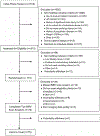Neural cue reactivity during acute abstinence predicts short-term smoking relapse
- PMID: 30806013
- PMCID: PMC6708755
- DOI: 10.1111/adb.12733
Neural cue reactivity during acute abstinence predicts short-term smoking relapse
Abstract
In smokers, neural responses to smoking cues can be sensitive to acute abstinence, but the degree to which abstinence-related cue reactivity contributes to relapse is not fully understood. This study addressed this question in a sample of 75 smokers who were motivated to quit smoking. Participants underwent blood-oxygen-level-dependent (BOLD) functional magnetic resonance imaging (fMRI) during presentation of visual smoking cues and neutral stimuli on two occasions: once during smoking satiety and once following 24-hour abstinence (order counterbalanced). Following the imaging sessions, participants received brief smoking cessation counseling prior to a short-term (7-day) quit attempt. The primary smoking cessation outcome was biochemically confirmed 7-day relapse. The secondary smoking cessation outcome measure was total number of self-reported days of abstinence. During abstinence (vs satiety), smoking cue reactivity was significantly increased only in the anterior cingulate cortex (ACC); other regions showing a cue (vs neutral) response did not exhibit an abstinence effect in the stringent whole-brain analysis. Participants who showed greater smoking cue reactivity in the ACC during acute abstinence (compared with smoking satiety) were more likely to relapse (OR = 2.10 per standard deviation increase in percent signal change [abstinence minus smoking satiety], 95% CI: 1.05 to 4.20, P = 0.036). Greater abstinence-induced change in ACC activation also predicted fewer total days abstinent (β = -0.63, 95% CI = 0.43 to 0.66, P < 0.0001). This study provides the first evidence that changes in smoking cue reactivity in the ACC during acute abstinence predict smoking relapse, thereby improving our understanding of the neurobiology of smoking cessation.
Trial registration: ClinicalTrials.gov NCT02837510.
Keywords: BOLD fMRI; short-term relapse; smoking cue reactivity.
© 2019 Society for the Study of Addiction.
Figures



Similar articles
-
Neural correlates of tobacco cue reactivity predict duration to lapse and continuous abstinence in smoking cessation treatment.Addict Biol. 2018 Sep;23(5):1189-1199. doi: 10.1111/adb.12549. Epub 2017 Sep 6. Addict Biol. 2018. PMID: 28877410 Free PMC article.
-
Working memory-related neural activity predicts future smoking relapse.Neuropsychopharmacology. 2015 May;40(6):1311-20. doi: 10.1038/npp.2014.318. Epub 2014 Dec 3. Neuropsychopharmacology. 2015. PMID: 25469682 Free PMC article.
-
Brain reactivity to smoking cues prior to smoking cessation predicts ability to maintain tobacco abstinence.Biol Psychiatry. 2010 Apr 15;67(8):722-9. doi: 10.1016/j.biopsych.2009.12.034. Epub 2010 Feb 20. Biol Psychiatry. 2010. PMID: 20172508 Free PMC article.
-
Smoking cues impair monitoring but not stopping during response inhibition in abstinent male smokers.Behav Brain Res. 2020 May 27;386:112605. doi: 10.1016/j.bbr.2020.112605. Epub 2020 Mar 14. Behav Brain Res. 2020. PMID: 32179061
-
Counterbalancing in smoking cue research: a critical analysis.Nicotine Tob Res. 2010 Nov;12(11):1068-79. doi: 10.1093/ntr/ntq159. Epub 2010 Sep 30. Nicotine Tob Res. 2010. PMID: 20884695 Free PMC article. Review.
Cited by
-
Precision Preventive Medicine of Relapse in Smoking Cessation: Can MRI Inform the Search of Intermediate Phenotypes?Biology (Basel). 2021 Dec 27;11(1):35. doi: 10.3390/biology11010035. Biology (Basel). 2021. PMID: 35053034 Free PMC article. Review.
-
The neurobiology of drug addiction: cross-species insights into the dysfunction and recovery of the prefrontal cortex.Neuropsychopharmacology. 2022 Jan;47(1):276-291. doi: 10.1038/s41386-021-01153-9. Epub 2021 Aug 18. Neuropsychopharmacology. 2022. PMID: 34408275 Free PMC article. Review.
-
Temporal Dynamics of Large-Scale Networks Predict Neural Cue Reactivity and Cue-Induced Craving.Biol Psychiatry Cogn Neurosci Neuroimaging. 2020 Nov;5(11):1011-1018. doi: 10.1016/j.bpsc.2020.07.006. Epub 2020 Jul 18. Biol Psychiatry Cogn Neurosci Neuroimaging. 2020. PMID: 32900658 Free PMC article.
-
The involvement of spontaneous brain activity in natural recovery from internet gaming disorder: A resting-state fMRI study.Front Psychiatry. 2023 Feb 21;14:1093784. doi: 10.3389/fpsyt.2023.1093784. eCollection 2023. Front Psychiatry. 2023. PMID: 36896348 Free PMC article.
-
Anterior cingulate cortex and its projections to the ventral tegmental area regulate opioid withdrawal, the formation of opioid context associations and context-induced drug seeking.Front Neurosci. 2022 Aug 5;16:972658. doi: 10.3389/fnins.2022.972658. eCollection 2022. Front Neurosci. 2022. PMID: 35992922 Free PMC article.
References
-
- Botvinick MM, Cohen JD, Carter CS (2004) Conflict monitoring and anterior cingulate cortex: an update. Trends Cogn Sci 8:539–546. - PubMed
Publication types
MeSH terms
Associated data
Grants and funding
LinkOut - more resources
Full Text Sources
Other Literature Sources
Medical

